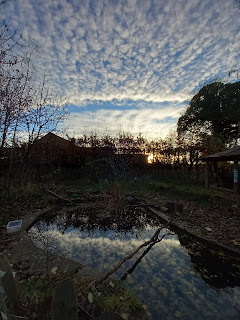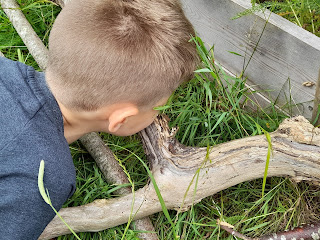Child Led
One of the more difficult aspects of Forest School for most people to come to terms with is the 'Child Led' ethos.
School Leaders, parents, any kind of inspector, and even the curious public often question it. Many of us have backgrounds in education before we train to deliver Forest School, so we are already well versed in curriculum areas, learning intentions, and engaging activities... all of which have planned outcomes. To then set children free to explore on their own requires an entire reset on how you've been facilitating learning and what you think it looks like.
Being open to this change doesn't mean you don't have to adapt.
I assume anyone training is already interested in a different way of helping children explore and understand the world around them. But whether it's a recent grounding in (or several years/decades of) data input via a spreadsheet, it frequently leads to a kind of hybrid approach to planning and assessment for Forest School Sessions.
The setting can influence this too.
If part of a school you may feel you should be able to offer proof of... X, Y & Z, or even be asked to show proof of it.
This can happen in EYFS settings too, with Forest School time feeding into Early Learning Goals.
Even parents paying for independent sessions have been known to ask for a 'report' on 'progress'.
The pressure to provide some kind of evidence of learning frequently leads to a mass of activities being devised or taken outside, to allow an end product as a trophy of completion and tangible evidence of progress.
1) It's not compulsory for the children to join in
2) It aids their Forest School Skills
3) It promotes the Forest School Ethos
I would like to say I'm not being judgemental - but obviously, I am, so let me explain further!
My intention is not to attack anyone's practice, just to make us all pause for thought before we introduce an activity to a session, and perhaps to back up those struggling with the pressure to provide a kind of Forest School they are not wholly comfortable with.
I have seen children wander home from sessions with pasta necklaces on rainbow cord, with hedgehog colouring in and dot-to-dot sheets, and with prizes for completing an Autumn Treasure Hunt (and no, there were no prizes for those who didn't find every shade of leaf!).
I have also seen children use secateurs to cut their own elder beads, and string them on twine.
I've seen children who look like they've been up a chimney take home 'cave drawings' of charcoal on large sugar paper.
I've seen children seek leaves of all colours for Art In Situ and collections on a nature table.
And I've seen children ignore all these options and choose to climb a tree, hunt for grasshoppers, or dig a hole.
Personalising activities to reflect Forest School Learning is important.
I'm sure I've said before that my own rule of thumb is if I can do it inside I'm not doing it outside!
I try not to introduce powder paint, squeezy paint, glue, glitter, plastic, potential litter etc to my setting. We can create fantastic Forest collages in classrooms. We can draw the most brilliant badgers at a table. We can cut out and make amazing animal masks INSIDE.
In Forest School, we can climb a tree, hide in the grass, crawl through bushes, dig the soil, make mud pies, watch the birds, peel a stick, collect feathers, look for mushrooms, feel the wind in our hair, taste the rain on our face, find bugs under logs, hear the crickets, swing on a rope, match leaves to trees, see the difference between acorns and conkers, watch the life cycle of a pine cone, marvel at the acrobatic squirrels, listen out for the pheasant, feed the Robins...We can even draw with mud and charcoal and chalk if we choose to!
The list is endless and cannot happen indoors.
In Forest School we engineer, research, explore, investigate, discover, plan, cooperate, collaborate, lead, follow, communicate, listen, create, participate, smile, laugh, debate, devise, organise, examine, and expand our vocabulary
We build resilience, self-esteem, motivation, and a positive attitude to learning.
Which is a long-winded way of saying
We play
We learn
We grow
But we are all used to long-winded, spell it out as expansively as possible, explanations for justifying the way humans gain knowledge.
Last week I explained that several classes, and year groups, have been digging in the Dig Pit and noticing the flint that they dig up (here). From Yr 2 - 6 they have cleaned and inspected many rocks, sorting them into 'plain' and 'exciting' piles. They organised themselves into a factory line of diggers, inspectors, cleaners, and sorters - and swapped around because they could see the value of each stage.
My knowledge (courtesy of Google Lens) is limited, so one of our wonderful TAs passed on a few specimens to a geologist. The outcome is that said geologist will be coming in to see the children, and the other rocks they have uncovered, and will answer the questions that totally thwart me!!!
This activity was never planned - or thought of! The Dig Pit is a given, it is always available, with digging tools, to all age groups. Over the last couple of years the children have asked questions about the stones, we've bought books on rocks and fossils, laminated info sheets about flint and types of rock, as well as layers of Geology, nationally and Kent
specific.
The children asked to clean them, which led to a request for paint brushes because 'archaeologists use them' to dust (and scrub) each find.
Bringing in an expert to answer their queries is the culmination of this term's Child Led activities. Their interest and motivation in exploring a self-chosen aspect of their environment, has guided ME to extend their learning and work with them to understand more.
These open-ended 'activities', the opportunity to 'just dig', throw out so many
different possibilities of learning. This brings me to the other reason some activities make me uncomfortable. Supervision. During this term, if I had been needed to watch over a 'focus activity', unable to move from helping to tie knots on a mask string, continuously finding the end of the sellotape, support the painting of rocks, etc, I wouldn't have been available to encourage the curiosity in the Dig Pit. I couldn't have responded to 'do you have any water we can wash them with?', or 'we need brushes', or 'what is this rock?', and 'can you tell me what this word says?' (It was ECHINOID by they way).
Also, remember these activities may be routine, part of continuous provision, and part of the fixtures and fittings of your Forest School, but they are valid. They are important. They were planned into the site, they have been adapted, they have evolved, they are popular, and they are the backbone of the experiences you provide. Our Copse basecamp is very much a resource centre the children access to go and discover things for themselves.
They deserve to be on your planning sheet week in/week out. They are learning opportunities that the children can explore of they want to. You may not be able to plan for the direction they take that learning but they have earned their place on site.
When the Dig Pit is full of puddles my groups become irrigation engineers, moving the water around to different areas - but I cannot plan for rain next week - I just have to follow their interest!
However, I can list 'Dig Pit' as a considered activity on my provision plan ever week!
One-off focuses and seasonal activities have their place, but be careful your time and energy focus isn't preventing Child-Led learning elsewhere.
Don't get me wrong, I'm not against activities at all.
We have them in all three of our settings on-site.
Just make the most of the outdoor environment we have to do our learning in - in a way that can't be done elsewhere!
For us, they have to be as independent as possible and promote Forest School as much as they can.
But we accept the children will have way better activities lined up than we do!
A Child-Led activity steers their learning in weird and wonderful directions... and yours!




.jpg)


.jpg)






Comments
Post a Comment